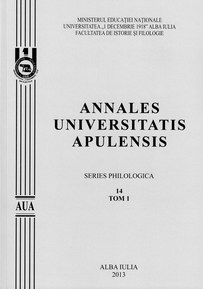Oportunităţile stilului e-tandem de studiere a limbii române pentru studenţii internaţionali
The e-tandem style opportunities of studying the Romanian language for international students
Author(s): Marcel Bâlici, Nadejda BâliciSubject(s): Language and Literature Studies
Published by: Universitatea »1 Decembrie 1918« Alba Iulia
Keywords: e-tandem; learning autonomy; constructivist learning perspective; interaction patterns; strategies for recovering the meaning; ontological skills.
Summary/Abstract: The advantage of the chosen style is the development of opportunities so as the students will accept and personalize the autonomous style of learning, use of authentic communication style (everyday communication situations, idioms, proverbs, ways of expressing internal states). The study focused on user and the discovery of the procedures for drafting strategies and personalized handbooks help applying constructivist learning perspective. Linking these goals to the real collaboration between the expert (native speaker) and the partner (user) through ICT, it is an effective way of acquiring the desired competencies. The article will describe: the constructivist learning perspective; the identification of the autonomous learning advantages; the use of ICT in order to facilitate the communication/language competences development; the implementation the strategies e-tandem for acquiring inter-comprehension skills. There are appropriate the presentations of methodological concepts which the style of work in tandem, etandem and teletandem are based on. It will be revealed the specific characteristics of each study ways for obtaining the multilingual communication skills. I will insist on the use of tandem for the acquisition of comprehension skills and developing of meaning recovery strategies. The history of tandem idea starts with face-to-face communication, and then by e-mail, chat, and had formed its contemporary structure via Skype or messenger. The role of the teacher is facilitator/counsellor, and the user shall develop metacognitive and ontological competences. Thus, the proposed information can form the basis of a project to study the Romanian language for international students by application of similar previous experiences. Native speaker will realise some morpho-syntactic structures, which previously he has not noticed and will explain it to the user. They will notice together the methodological strengths and weak points, and will have the possibility to cooperate outside of the project study. Such activities entail and an authentic intercultural exchange of visions. Training activities will be combined with the personalized and group identification, cultural identification that results in socialization, creating a vision of global symmetry and interdependence. Autonomous learning style with the use of e-tandem model involves a particular interaction. The communication system is conceptualized, and channels of communication are very diverse (chat, email, Skype). It will be described the characteristics of the communication channels from the perspective of obtaining skills/abilities relating to the production and understanding of the speech from the perspective of multilingualism.The fundamental principle that underpins e-tandem is reciprocity.
Journal: Annales Universitatis Apulensis. Series Philologica
- Issue Year: 14/2013
- Issue No: 1
- Page Range: 463-468
- Page Count: 6
- Language: Romanian

